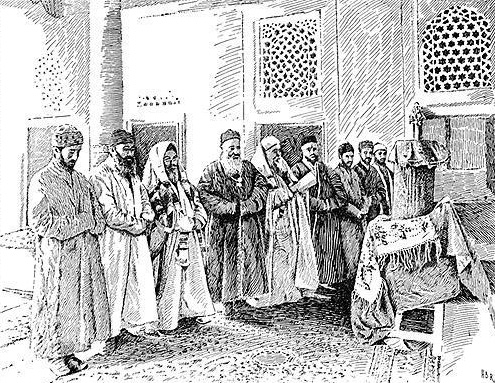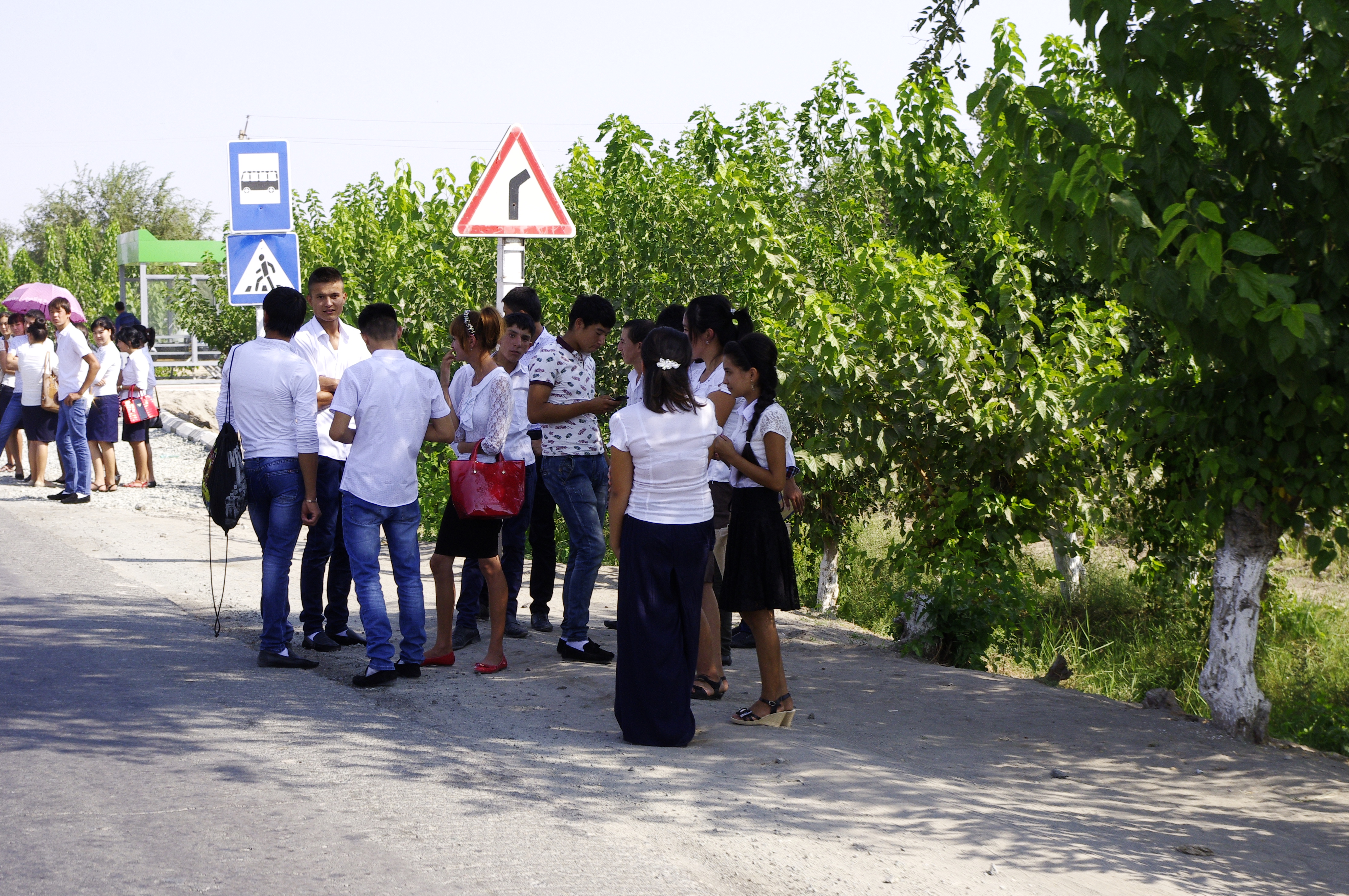|
Gavriel Mullokandov
Gavriel Aronovich Mullokandov ( uz, Гавриэл Муллоқандов, Gavriel Mulloqandov, russian: Гавриэль Аронович Муллокандов; 8 April 1900 – 6 February 1972) is widely regarded as the greatest Bukharian Jewish singer and musician. He was the People's Artist of Uzbekistan. Biography Gavriel Mullokandov was born on 8 April 1900 in Samarkand to a family of music lovers. He got much of his musical training and experience from his older brothers and from the age of nine began to sing in synagogue. At the age of 11 Gavriel was already singing at weddings and concerts and the public loved him. From his childhood, he learned about the shashmaqam music style and could play a number of Musical instrument, instruments, including the Daf, doira. During the 1920s Gavriel worked with his brother Mikhael, who was also one of the greatest singers and musicians in Central Asia. In 1925–26 they were joined by Levi Bobokhanov, who once was a court musicia ... [...More Info...] [...Related Items...] OR: [Wikipedia] [Google] [Baidu] |
Bukharian Jewish
Bukharan Jews ( Bukharian: יהודיאני בוכארא/яҳудиёни Бухоро, ''Yahudiyoni Bukhoro''; he, יהודי בוכרה, ''Yehudey Bukhara''), in modern times also called Bukharian Jews ( Bukharian: יהודיאני בוכארי/яҳудиёни бухорӣ, ''Yahudiyoni Bukhorī''; he, יהודים בוכרים, ''Yehudim Bukharim''), are an ethnoreligious Jewish sub-group of Central Asia that historically spoke Bukharian, a Judeo-Tajik dialect of the Tajik language, in turn a variety of the Persian language. Their name comes from the former Central Asian Emirate of Bukhara (now primarily Uzbekistan), which once had a sizable Jewish population. Bukharan Jews comprise Persian-speaking Jewry along with the Jews of Iran, Afghanistan, and the Caucasus Mountains. Since the dissolution of the Soviet Union, the great majority have immigrated to Israel or to the United States while others have immigrated to Europe or Australia. Bukharan Jews are Mizrahi Jews ... [...More Info...] [...Related Items...] OR: [Wikipedia] [Google] [Baidu] |
Supreme Soviet Of The Uzbek Soviet Socialist Republic
The Supreme Soviet of the Uzbek SSR ( uz, Ўзбекистон ССР Олий Совети, Oʻzbekiston SSR Oliy Soveti; russian: Верховный Совет Узбекской ССР, Verkhovnyy Sovet Uzbekskoy SSR) was the supreme soviet (main Legislature, legislative institution) of the Uzbek SSR from 1938 to 1991. The Supreme Soviet of the Uzbek SSR was preceded by the All-Uzbek Congress of Soviets which operated from 1925 to 1938. After the 1991 Uzbek independence election, independence of Uzbekistan in 1991, the Supreme Soviet of the Uzbek SSR was briefly succeeded by the Supreme Council of the Republic of Uzbekistan from 1991 to 1994. The 1990 Uzbek Supreme Soviet election was the first and final supreme soviet election which allowed for multiparty elections. History The Supreme Soviet of the Uzbek SSR was established pursuant to constitutional reforms within the Uzbek Soviet Socialist Republic, Uzbek SSR, which changed the organization of main political organs of ... [...More Info...] [...Related Items...] OR: [Wikipedia] [Google] [Baidu] |
Uzbekistani Musicians
The demographics of Uzbekistan are the demographic features of the population of Uzbekistan, including population growth, population density, ethnicity, education level, health, economic status, religious affiliations, and other aspects of the population. The nationality of any person from Uzbekistan is Uzbekistani, while the ethnic Uzbek majority call themselves Uzbeks. Much of the data is estimated because the last census was carried out in Soviet times in 1989. Demographic trends Uzbekistan is Central Asia's most populous country. Its 35 million people ( estimate) comprise nearly half the region's total population. The population of Uzbekistan is very young: 25.1% of its people are younger than 14. According to official sources, Uzbeks comprise a majority (84.4%) of the total population. Other ethnic groups, as of 1996 estimates, include Russians (5.5% of the population), Tajiks (5%), Kazakhs (3%), Karakalpaks (2.5%), and Tatars (1.5%).Uzbekistan iCIA World Factbook/ref> Uzb ... [...More Info...] [...Related Items...] OR: [Wikipedia] [Google] [Baidu] |
Soviet Jews
The history of the Jews in the Soviet Union is inextricably linked to much earlier expansionist policies of the Russian Empire conquering and ruling the eastern half of the European continent already before the Bolshevik Revolution of 1917. "For two centuries – wrote Zvi Gitelman – millions of Jews had lived under one entity, the Russian Empire and its successor state the USSR. They had now come under the jurisdiction of fifteen states, some of which had never existed and others that had passed out of existence in 1939." Before the revolutions of 1989 which resulted in the end of communist rule in Central and Eastern Europe, a number of these now sovereign countries constituted the component republics of the Soviet Union. Armenia The history of the Jews in Armenia dates back more than 2,000 years. After Eastern Armenia came under Russian rule in the early 19th century, Jews began arriving from Poland and Iran, creating Ashkenazic and Mizrahi communities in Yerevan. More Jews ... [...More Info...] [...Related Items...] OR: [Wikipedia] [Google] [Baidu] |
Uzbekistani Jews
The demographics of Uzbekistan are the demographic features of the population of Uzbekistan, including population growth, population density, ethnicity, education level, health, economic status, religious affiliations, and other aspects of the population. The nationality of any person from Uzbekistan is Uzbekistani, while the ethnic Uzbek majority call themselves Uzbeks. Much of the data is estimated because the last census was carried out in Soviet times in 1989. Demographic trends Uzbekistan is Central Asia's most populous country. Its 35 million people ( estimate) comprise nearly half the region's total population. The population of Uzbekistan is very young: 25.1% of its people are younger than 14. According to official sources, Uzbeks comprise a majority (84.4%) of the total population. Other ethnic groups, as of 1996 estimates, include Russians (5.5% of the population), Tajiks (5%), Kazakhs (3%), Karakalpaks (2.5%), and Tatars (1.5%).Uzbekistan iCIA World Factbook/ref> Uzb ... [...More Info...] [...Related Items...] OR: [Wikipedia] [Google] [Baidu] |
Bukharan Jews
Bukharan Jews ( Bukharian: יהודיאני בוכארא/яҳудиёни Бухоро, ''Yahudiyoni Bukhoro''; he, יהודי בוכרה, ''Yehudey Bukhara''), in modern times also called Bukharian Jews ( Bukharian: יהודיאני בוכארי/яҳудиёни бухорӣ, ''Yahudiyoni Bukhorī''; he, יהודים בוכרים, ''Yehudim Bukharim''), are an ethnoreligious Jewish sub-group of Central Asia that historically spoke Bukharian, a Judeo-Tajik dialect of the Tajik language, in turn a variety of the Persian language. Their name comes from the former Central Asian Emirate of Bukhara (now primarily Uzbekistan), which once had a sizable Jewish population. Bukharan Jews comprise Persian-speaking Jewry along with the Jews of Iran, Afghanistan, and the Caucasus Mountains. Since the dissolution of the Soviet Union, the great majority have immigrated to Israel or to the United States while others have immigrated to Europe or Australia. Bukharan Jews are Mizrahi Jew ... [...More Info...] [...Related Items...] OR: [Wikipedia] [Google] [Baidu] |
People From Samarkand
A person ( : people) is a being that has certain capacities or attributes such as reason, morality, consciousness or self-consciousness, and being a part of a culturally established form of social relations such as kinship, ownership of property, or legal responsibility. The defining features of personhood and, consequently, what makes a person count as a person, differ widely among cultures and contexts. In addition to the question of personhood, of what makes a being count as a person to begin with, there are further questions about personal identity and self: both about what makes any particular person that particular person instead of another, and about what makes a person at one time the same person as they were or will be at another time despite any intervening changes. The plural form "people" is often used to refer to an entire nation or ethnic group (as in "a people"), and this was the original meaning of the word; it subsequently acquired its use as a plural form of per ... [...More Info...] [...Related Items...] OR: [Wikipedia] [Google] [Baidu] |
1972 Deaths
Year 197 ( CXCVII) was a common year starting on Saturday (link will display the full calendar) of the Julian calendar. At the time, it was known as the Year of the Consulship of Magius and Rufinus (or, less frequently, year 950 '' Ab urbe condita''). The denomination 197 for this year has been used since the early medieval period, when the Anno Domini calendar era became the prevalent method in Europe for naming years. Events By place Roman Empire * February 19 – Battle of Lugdunum: Emperor Septimius Severus defeats the self-proclaimed emperor Clodius Albinus at Lugdunum (modern Lyon). Albinus commits suicide; legionaries sack the town. * Septimius Severus returns to Rome and has about 30 of Albinus's supporters in the Senate executed. After his victory he declares himself the adopted son of the late Marcus Aurelius. * Septimius Severus forms new naval units, manning all the triremes in Italy with heavily armed troops for war in the East. His soldiers embark ... [...More Info...] [...Related Items...] OR: [Wikipedia] [Google] [Baidu] |
1900 Births
Nineteen or 19 may refer to: * 19 (number), the natural number following 18 and preceding 20 * one of the years 19 BC, AD 19, 1919, 2019 Films * ''19'' (film), a 2001 Japanese film * ''Nineteen'' (film), a 1987 science fiction film Music * 19 (band), a Japanese pop music duo Albums * ''19'' (Adele album), 2008 * ''19'', a 2003 album by Alsou * ''19'', a 2006 album by Evan Yo * ''19'', a 2018 album by MHD * ''19'', one half of the double album ''63/19'' by Kool A.D. * ''Number Nineteen'', a 1971 album by American jazz pianist Mal Waldron * ''XIX'' (EP), a 2019 EP by 1the9 Songs * "19" (song), a 1985 song by British musician Paul Hardcastle. * "Nineteen", a song by Bad4Good from the 1992 album '' Refugee'' * "Nineteen", a song by Karma to Burn from the 2001 album ''Almost Heathen''. * "Nineteen" (song), a 2007 song by American singer Billy Ray Cyrus. * "Nineteen", a song by Tegan and Sara from the 2007 album '' The Con''. * "XIX" (song), a 2014 song by Slipk ... [...More Info...] [...Related Items...] OR: [Wikipedia] [Google] [Baidu] |
Central Committee Of Uzbekistan
Central is an adjective usually referring to being in the center of some place or (mathematical) object. Central may also refer to: Directions and generalised locations * Central Africa, a region in the centre of Africa continent, also known as Middle Africa * Central America, a region in the centre of America continent * Central Asia, a region in the centre of Eurasian continent * Central Australia, a region of the Australian continent * Central Belt, an area in the centre of Scotland * Central Europe, a region of the European continent * Central London, the centre of London * Central Region (other) * Central United States, a region of the United States of America Specific locations Countries * Central African Republic, a country in Africa States and provinces * Blue Nile (state) or Central, a state in Sudan * Central Department, Paraguay * Central Province (Kenya) * Central Province (Papua New Guinea) * Central Province (Solomon Islands) * Central Province, Sri ... [...More Info...] [...Related Items...] OR: [Wikipedia] [Google] [Baidu] |



.jpg)
_1938.jpg)